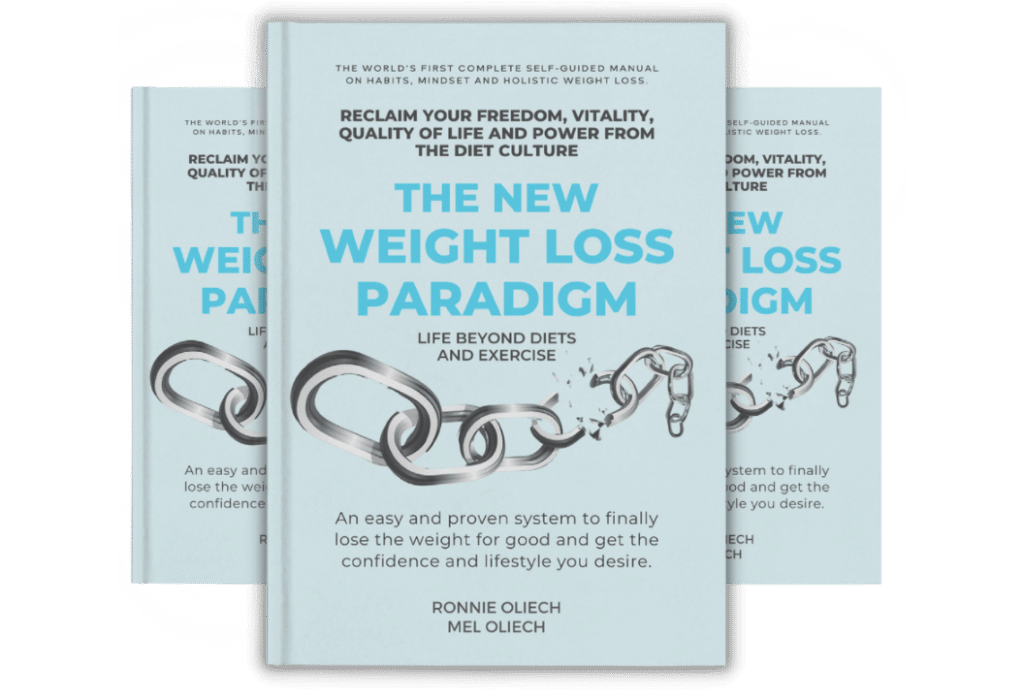If you’ve been struggling to lose weight despite paying attention to your diet and exercise, don’t worry. There’s nothing wrong with you.
You may have just been focusing on losing the wrong kind of weight.
You see, the weight that you need to lose, in order to change your body shape, isn’t physical weight at all. It’s the weight of all your emotional baggage that you’ve been carrying around for years. This stuff weighs you down in more ways than you can imagine, and actually prevents you from losing weight and keeping it off.
In fact, focusing on losing only the physical weight, and ignoring the emotional weight will only lead to weight gain, because it’s the emotional weight that weighs you down the most, and is the reason you became overweight in the first place.
Quick-fixes fail to address this issue — focusing only on diet and exercise. However, the problem of your emotional weight can’t be solved by food and exercise.
The truth is that once you start focusing on losing the right kind of weight — the emotional baggage — then you’ll experience consistent weight loss, which will be permanent.
But what do we mean by emotional baggage and how does it impede your weight loss? Glad you asked.
Shame and embarrassment
If you’re overweight there’s every chance that you feel ashamed.
Most people who struggle with their weight feel shame about their body, about their habits, their appearance, and how they let themselves become overweight.
What is shame? According to Brene Brown, a research professor who studies shame, it is “the intensely painful feeling or experience of believing that we are flawed and therefore unworthy of love and belonging.”
Where guilt (see below) is about something we did, shame is about something we are (or aren’t).
One of the key causes of shame around body image is the diet industry itself. Even though science has proved that diets don’t work, the diet industry continues to sell them, and then blames the dieter for not being able to lose weight with their faulty product. This increases the levels of shame and inadequacy around body image and weight.
For women, the number one shame trigger is appearance and body image. For men, it’s the appearance of being ‘weak’. This explains why so many men and women don’t actually get started on a journey to lose weight — because they’re too embarrassed to be seen as overweight, or weak.
Shame has many negative outcomes including depression, anxiety, low self-esteem, lack of confidence and self-destructive behaviour such as drinking, binge eating, and emotional eating in order to soothe the pain. It also causes you to believe that you’re not worthy of having the body you’ve always wanted, and that you’re incapable of losing weight.
If you’re feeling ashamed, chances are you’re also feeling embarrassed, because shame and embarrassment go hand-in-hand. Embarrassment is that feeling of self-consciousness or awkwardness that makes you feel exposed and vulnerable.
None of us want to feel embarrassed and exposed, but unfortunately, not being willing to be vulnerable and to be seen for where you really are, will prevent you from losing weight. That’s because you’ll either hide, or pretend you’re further along the journey than you really are.
Of course, hiding from your problems and pretending they don’t exist won’t solve your weight problems. Hiding might keep you comfortable for a while, but you’ll never overcome the pain of being overweight. Instead, you’ll always be struggling to lose weight because you’re too afraid to take action.
Pretending to be further along the journey than you really are, means you won’t get help for the things that you’re really struggling with. It’s a bit like going to the doctor because you’re experiencing bad headaches, but telling them that you have a sore throat. The treatment for your sore throat will not be able to treat your headaches.
However, when you stop feeling embarrassed and become willing to be seen for your reality — warts and all — you’ll finally get the pieces of the weight loss puzzle you really need, to start your journey towards long-term weight loss.
Guilt
While shame is about what you are, guilt is about what you do.
People struggling to lose weight often feel guilty. They feel guilty that they are overweight, guilty about putting themselves first, and guilty about the food they eat. Research suggests that guilt around weight and food may actually cause you to gain weight, as it causes a metabolic slow down. This guilt, and the stress around feeling guilty, negatively impacts body image, which then increases the likelihood of binge eating or excessive drinking, as a way to feel better.
If you want to succeed in losing weight, you need to remove the guilt you feel around food. There are no ‘good’ foods or ‘bad’ foods, like the diet industry has suggested. It’s just food. Of course, there are some foods that provide you with better nutrition than others. And if you constantly eat foods high in calories, fat and sugar, then you will gain weight. But indulging in your favourite foods or eating out every now and then, can actually help you lose weight and stay on track. Learning how to relax with food and stop seeing it as the enemy is an important step in losing weight and keeping it off for good.
Low self-esteem and low self-worth
Feeling unworthy or having low self-esteem is a disaster when it comes to weight loss. Feeling unworthy of love means you’ll always be seeking the approval and validation from other people, which leads to the classic behaviour of people-pleasing. Trying to be all things to all people isn’t about being a ‘nice’ person. It’s about making yourself feel better about who you are. The reason you say ‘yes’ to everyone is because you believe this will mean you’ll be accepted and loved. People-pleasing can be:
- going along with the majority to feel like you fit in, even if it’s something you disagree with
- saying ‘yes’ to doing something, even if you don’t want to
- agreeing with someone because you want to avoid conflict
- spreading gossip about other people as a way to feel like you belong to a group
- putting your needs and desires last because you’re afraid of upsetting people
- feeling responsible for other people and getting involved in their problems
- needing other people to praise you in order to feel good
- apologising for your beliefs and actions.
Ironically, people-pleasing only leads to further erosion of your self-esteem and self-worth because it eventually becomes obvious that people only like you for what you do for them, rather than for who you are. And when you keep trying to fit in with everyone, you end up losing your own sense of identity, which leaves you feeling even worse.
People-pleasing also prevents you from doing the things you need to do, to lose weight, because you spend all your time looking after other people’s needs instead of your own. This means you’ll end up skimping on sleep, missing workouts, not having enough time to food-prep, or may even end up drinking alcohol, just to keep other people happy.
The truth is you can’t keep everyone happy all the time. Trying to do so only leaves you unhappy and sabotages any efforts you put in towards losing weight. However, when you learn to love yourself unconditionally, and stop seeking validation from other people through trying to please them, you’ll finally be able to put your needs first, and you’ll be on the path to long-term weight loss.
Self-doubt and lack of confidence
Henry Ford, founder of the Ford Motor Company used to say “whether you think you can, or think you can’t, you’re right.”
Not believing in yourself is a sure-fire way to fail at weight loss, or anything else you do in life. Doubting your ability to lose weight or even the people helping you, will make it nearly impossible for you to succeed.
A lot of people who have been on the diet merry-go-round struggle with doubt. That’s because every effort to lose weight ends up backfiring. But instead of blaming the diet, they blame themselves, which leads to self-doubt and lack of confidence.
Lack of confidence causes you to live in your comfort zone and become complacent. You end up not taking any action at all because you can’t make decisions, are afraid to try new things, and don’t believe that you can do something new anyway, which means you don’t even try.
Overcoming doubt isn’t always easy, but it can be done. A key step is learning to celebrate your success, even the little wins. Every time you celebrate progress, you end up building your self-belief and confidence in yourself a little more as you’ll begin to see that you can actually succeed.
Hanging out with people who are succeeding in losing weight is also vital because success leaves clues. Seeing how other people have overcome their doubts can give you confidence that you can as well. And don’t forget to surround yourself with a support network who will hold you accountable, support you and celebrate your success along the way.
Of course, working with a coach will mean that together, you can develop a personalised, structured action plan to help you overcome your doubts and put you on the road to self-belief.
Perfectionism
Trying to get everything perfect doesn’t work for weight loss. Perfectionism involves putting pressure on yourself to continually meet impossibly high standards. It’s a behaviour that is driven by fear — fear of being judged and fear of not being good enough. But instead of motivating you to do your best, these fears actually paralyse you from taking action.
If you’re a perfectionist, you’ll often engage in all-or-nothing thinking, which means that you’d rather do nothing at all if you can’t do something right. Of course, taking no action at all doesn’t help you to lose weight. You may also be afraid of taking risks which means that you’re not willing to step out of your comfort zone and try new things, or work on your habits. This will mean you’ll often get ‘stuck’ on your weight loss journey.
Perfectionists very rarely listen to their body either. Instead, they focus on getting food and exercise ‘perfect’ by following rules and structured plans, believing that the answers lie in getting everything right. That means following rigid diets, and exercising through illness or fatigue. But this only causes a host of other problems. Firstly, you’re increasing the risk of burnout and injury, which means you’ll end up being inconsistent with your efforts to lose weight. Secondly, being so strict with your food will increase the likelihood of binge eating and emotional eating, which will see you swinging back and forth between restriction and overeating, meaning you’ll continue to struggle to lose weight.
Perfectionism also leads to unrealistic expectations about your weight loss and what the journey should look like.
Unrealistic expectations
If you’re a chronic dieter, you’ve probably been led to believe that you can get quick results in minimal time, by cutting back your food and increasing your exercise. While doing this will get you quick results, it won’t get you long-lasting results. In fact, whatever weight you lose with this approach, you’ll end up gaining back with interest!
True weight loss that will last for a lifetime will take time. That’s because the only way to achieve this is to address the habits that have led you to become overweight in the first place. When you fully understand this, and accept that you need to work on your habits, instead of thinking that your weight can be ‘fixed’ with diet and exercise, you’ll be on the path to success.
However, the path towards your goals is not linear. There will be many bumps and setbacks along the way. This is a normal part of achieving anything, including weight loss. However, if you have unrealistic expectations that you’ll be able to achieve your goals with little or no resistance, then you’ll be disappointed. You may also stop and start different diets, as you look for the one that will have all the answers. This only keeps you stuck in a rut, and struggling with your weight for longer.
The reality of a body transformation is that it will take time, and there will be obstacles you’ll need to overcome. There will be parts of the journey that will feel easy, and parts that won’t. Be sure to read our blogs The Seasons of Body Transformation and The Stages of a Body Transformation to gain an honest understanding of what a body transformation is really like.
Need to feel in control
Your need to control everything or feel in control of everything will also sabotage your weight loss. The need to feel in control is based on a belief that it will keep us safe, so we don’t have to worry about things. Those who need to feel in control are often afraid of being at the mercy of other people or situations, so they may develop systems and rules in their daily routine, to feel safe and secure. When it comes to weight loss, this can equate to controlling food, controlling exercise and not being willing to take chances, risks or new things.
Many people who need to feel in control find themselves doing the same diets over and over again, believing that all they need to succeed is more control or willpower. However, success will be found in doing something different to what you have always done, but to do this, you need to let go of control and take a leap of faith. This can feel incredibly scary.
The truth is that none of us can control everything, but we can control some things. Focusing on what you can control, letting go of the rest and not giving into your fear of the unknown will help with your weight loss. Be sure to read our blog How to feel in control when everything is out of control, for further information on this.
Comparing yourself
Many people have the habit of comparing themselves with others. They compare their looks, weight, body, job, finances, kids, etc. But comparing yourself with other people will only make it more difficult to lose weight because:
- you’ll be confused about your own goals
- you’ll be distracted by what other people are doing
- you won’t be focusing on the right actions that you need to take
- you won’t be working on your habits
- you won’t celebrate your wins and progress
- you’ll feel resentful, angry and frustrated.
When you compare yourself to others, you’re comparing their highlight reel with your reality, which isn’t a fair comparison. It’s like comparing apples with oranges, which is a waste of time because it’s not getting you any closer to your goals.
However, accepting where you really are on your journey, and the things you struggle with, will mean that you’ll be given the right action steps for you. By having tunnel vision and focusing on your own journey, and your own action steps, you’ll be able to stop struggling with your weight loss because you’ll be working on the things that will make the biggest difference to you.
It’s important to understand that the above list isn’t an exhaustive list of all the emotional baggage you may need to drop. There are many other emotional issues that could possibly hold people back. However, the ones we’ve addressed are the main ones that play a hand in the inability to lose weight.
Unless you focus on losing the emotional weight, you’ll constantly sabotage your weight loss, because the emotional baggage will keep dragging you back into your old habits.
The journey to long-term, permanent weight loss isn’t so much the journey to losing the weight. It’s about unbecoming the person you are today, so you can be the kind of person who can be a health weight in the future.
For example, if you’re a people-pleaser, you need to un-become a people-pleaser in order to put yourself first and focus on the actions that will help you lose weight.
Focusing on losing the right kind of weight — the weight of emotional baggage — will mean that the physical weight loss will take care of itself.
Drop the baggage
It may be hard to understand or even hear, but dropping the weight of your emotional baggage is the only way you’ll finally be free to focus on losing the physical weight. The answers aren’t found in more control around food or exercise, exercising more willpower, or following quick-fixes and fad diets.
The answer lies in dropping all the emotional baggage that you have collected over the years. At some point these things would have served to keep you safe. But staying safe doesn’t equate to weight loss. In fact, continuing to engage in these ‘safe’ thoughts and behaviours only sabotages your efforts to lose weight. To lose weight and keep it off you need to confront your fears head on, instead of hiding from them.
If you’re finally ready to confront your fears and drop your emotional and physical weight, we can help.
Through our structured, personalised program, we can identify the habits, mindsets and emotional baggage that have been holding you back for years, and provide you the accountability in order to succeed. We will be there every step of the way, guiding and supporting you so you can drop the emotional baggage, lose weight, and have the body and life you’ve always craved.
Imagine feeling confident and proud. Imagine feeling free around food. Imagine being okay with not being in control or being perfect. If you come on a journey with us, we can make this dream a reality. We’ve already helped countless others get rid of the emotional baggage that was weighing them down, so they become more confident, self-assured and lose weight, so we know we can help you.


















